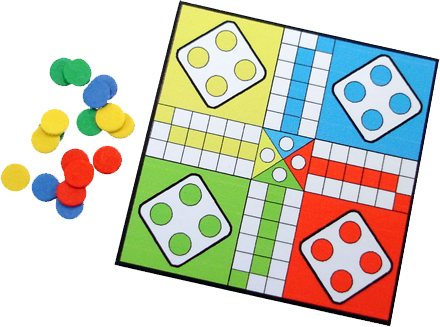Ludo
Ludo is a type of board game that can be played by 2 or 4 players. In this game, the players have to race their 4 tokens from the starting to the finishing point according to the roll of the dice. Ludo is similar to many other games involving cross and circle, especially the Indian game of Pachisi. However, it is much simpler than Pachisi. The game of Ludo and its variants have achieved widespread popularity in many countries throughout the world under various names.
Origins and earlier history of Ludo
The game of Pachisi originated in India somewhere around the 6th century. The illustration of
playing boards on Ajanta caves are the earliest proof of this game to be played in India.
In India, Pachisi was also played by the various Mughal emperors. The great Mughal emperor
Jalaluddin Muhammad Akbar used to play live Pachisi by using his harem girls.
Other variations of the Pachisi game were introduced to England around late nineteenth century.
One of these versions which appeared around the year 1896 was successfully patented under the
name Ludo.

Other variations of Ludo
In North America, Ludo is marketed under its brand name of "Parcheesi". Numerous variations
of "Parcheesi" are available under the names of "Trouble" and "Sorry!".
Different variations of this game are available under different local names in Germany as well as in
the Dutch, Bulgarian, Czech, Serbo-Croatian and Slovak territories.
The game is popular by the name of "Fia" in Sweden. However, in countries Norway and Denmark,
the game is popularly known as Ludo.
Rules of Ludo
At the beginning of the game, a player places his or her four pieces in the starting area of their color.
The players then take turns to throw the die. A player will have to throw a 6 before he or she is able
to navigate a colored piece from its starting point to the starting square. After that, in each of the
subsequent turns the player navigates a piece forward for one to six squares as per indicated by the
throwing die. Once a player throws 6 with the die, the player may choose to introduce a new piece
in the starting square. He may also decide to navigate a piece that is already active. The player also
gets another bonus turn. However, a foul is said to have been committed if the player rolls 6 for
three consecutive times. A player forfeits his or her turn on such occasions.
In cases where the player has rolled a six, the player may also choose to separate the chances if both
pieces are active. For example, he or she can navigate one piece by 6 houses and another piece by 4
houses. Conversely, both the chances can be played using one single piece only; i.e. the player may
navigate one piece for 6+4=10 houses. If the player is unable to make an appropriate move after the
first movement of 6, the die will be passed on to another player.
Sister Sites
If you want to play online, we would also like to recommend some of our sister sites:
Dig Solitaire - Solitaire Games with Hiscores
Online freecell games, rules and history